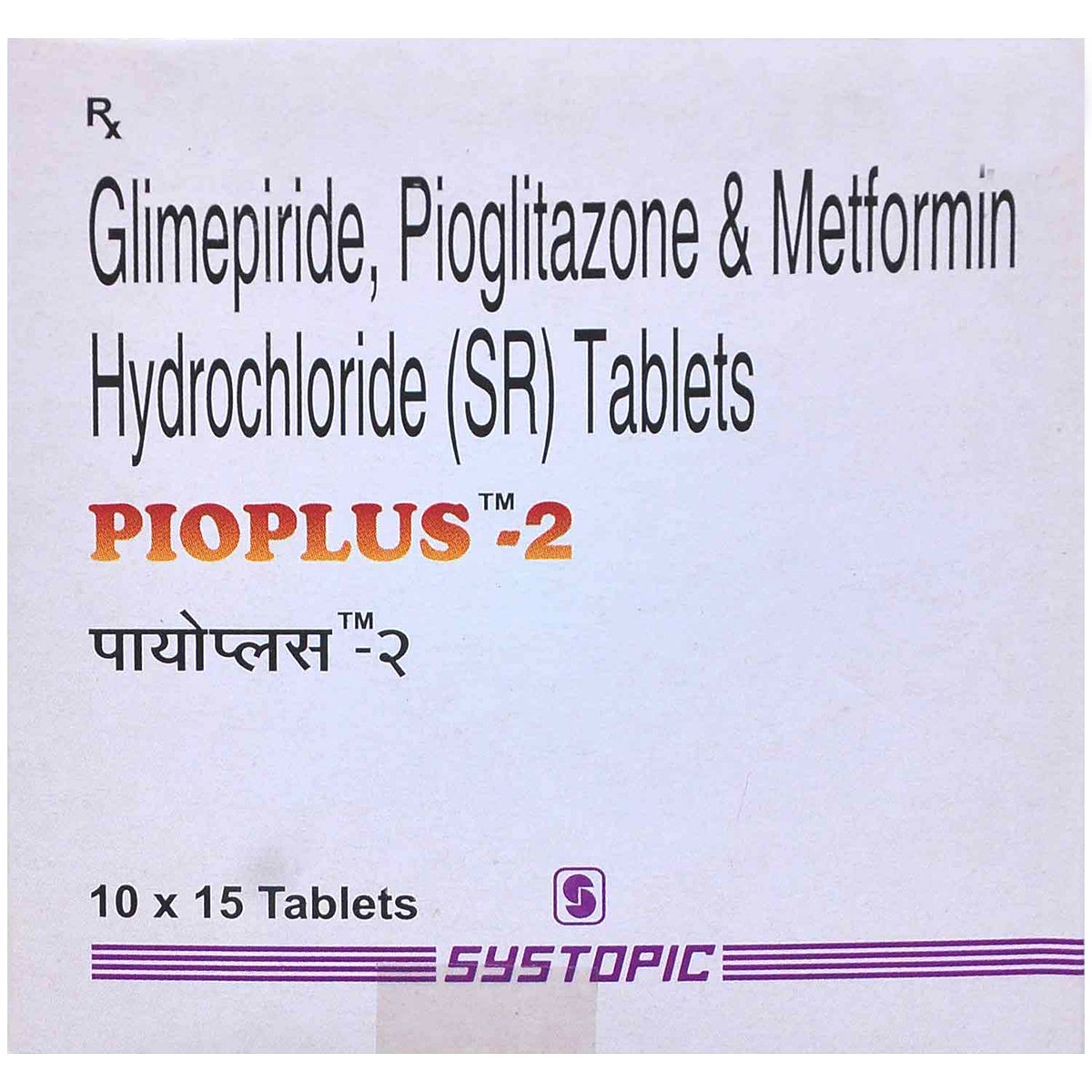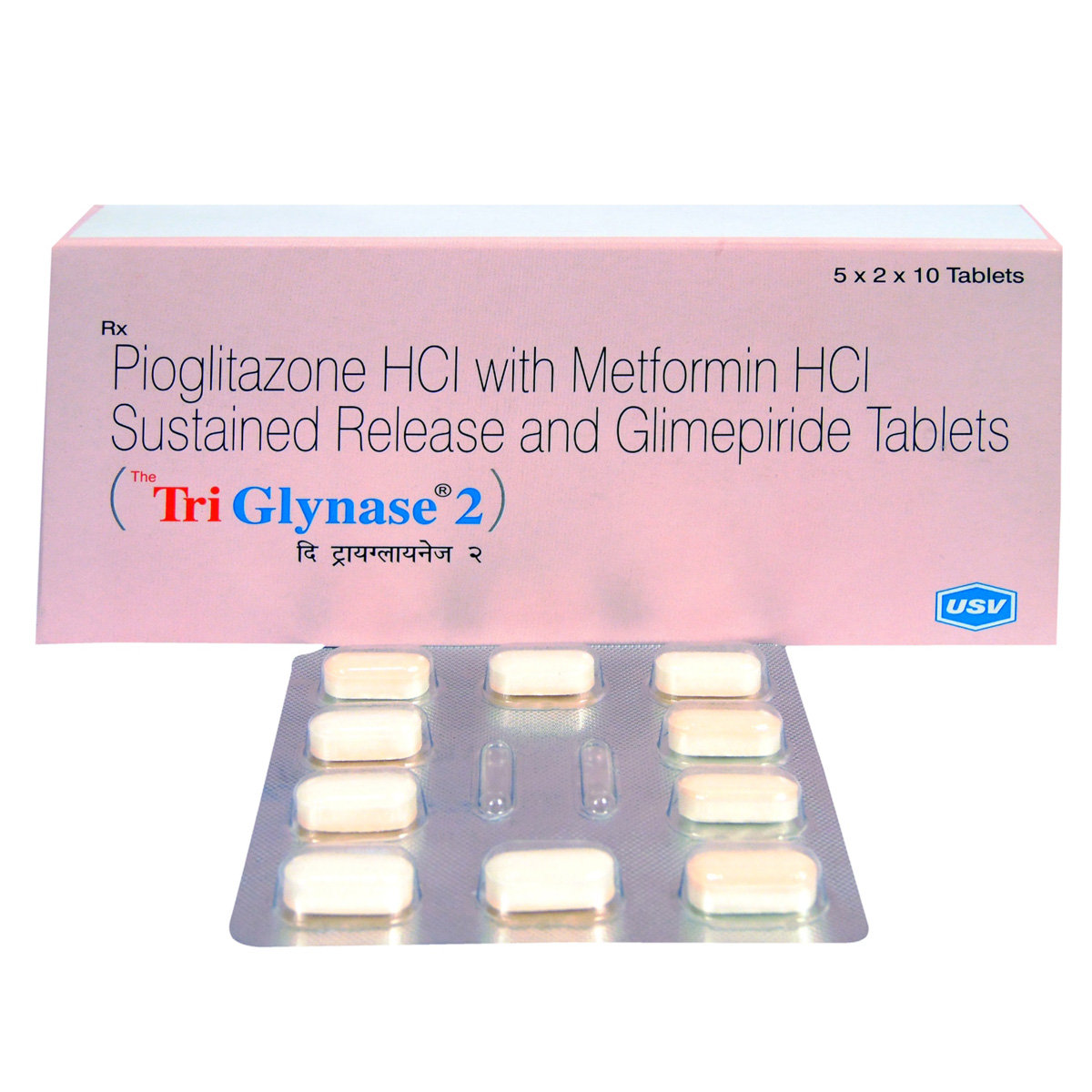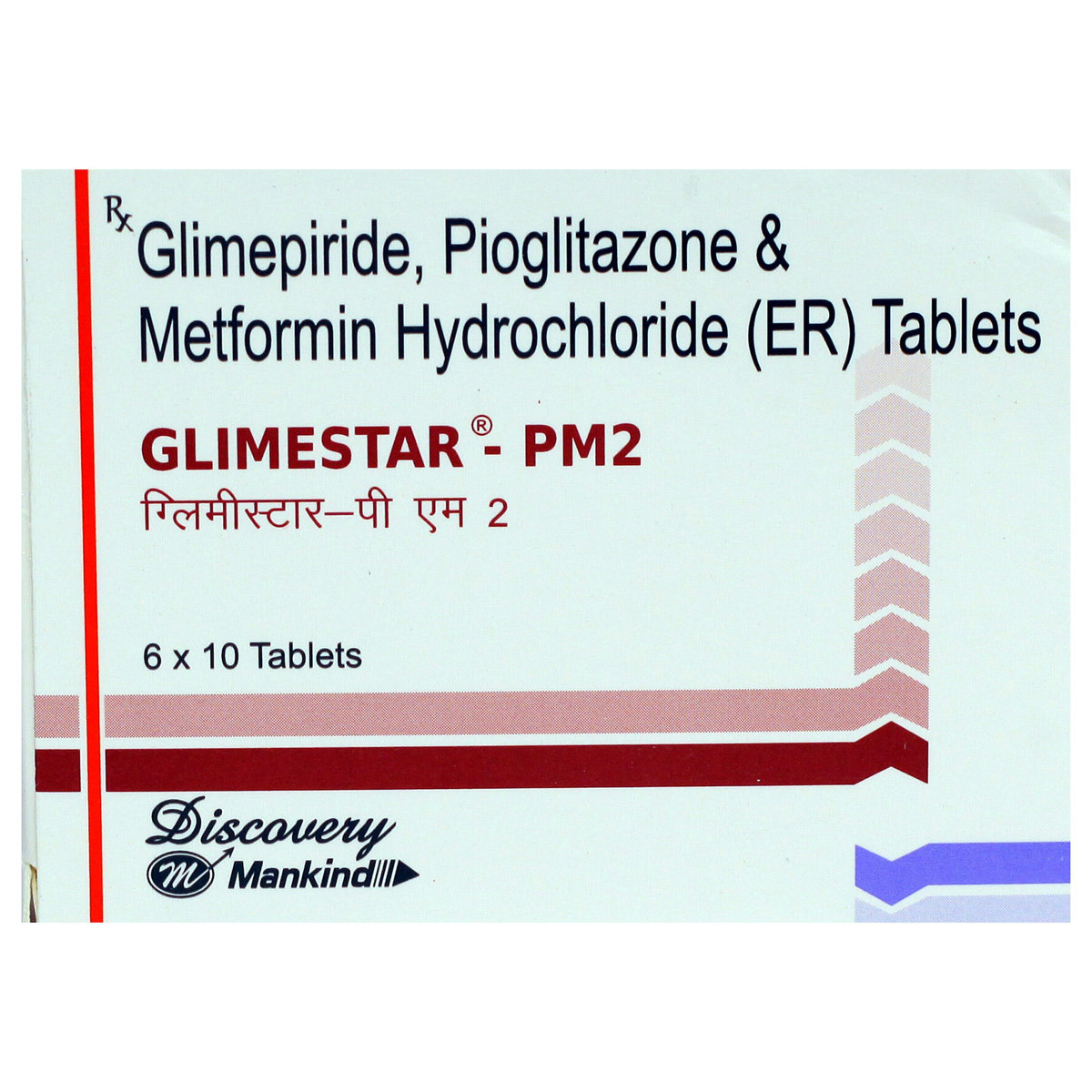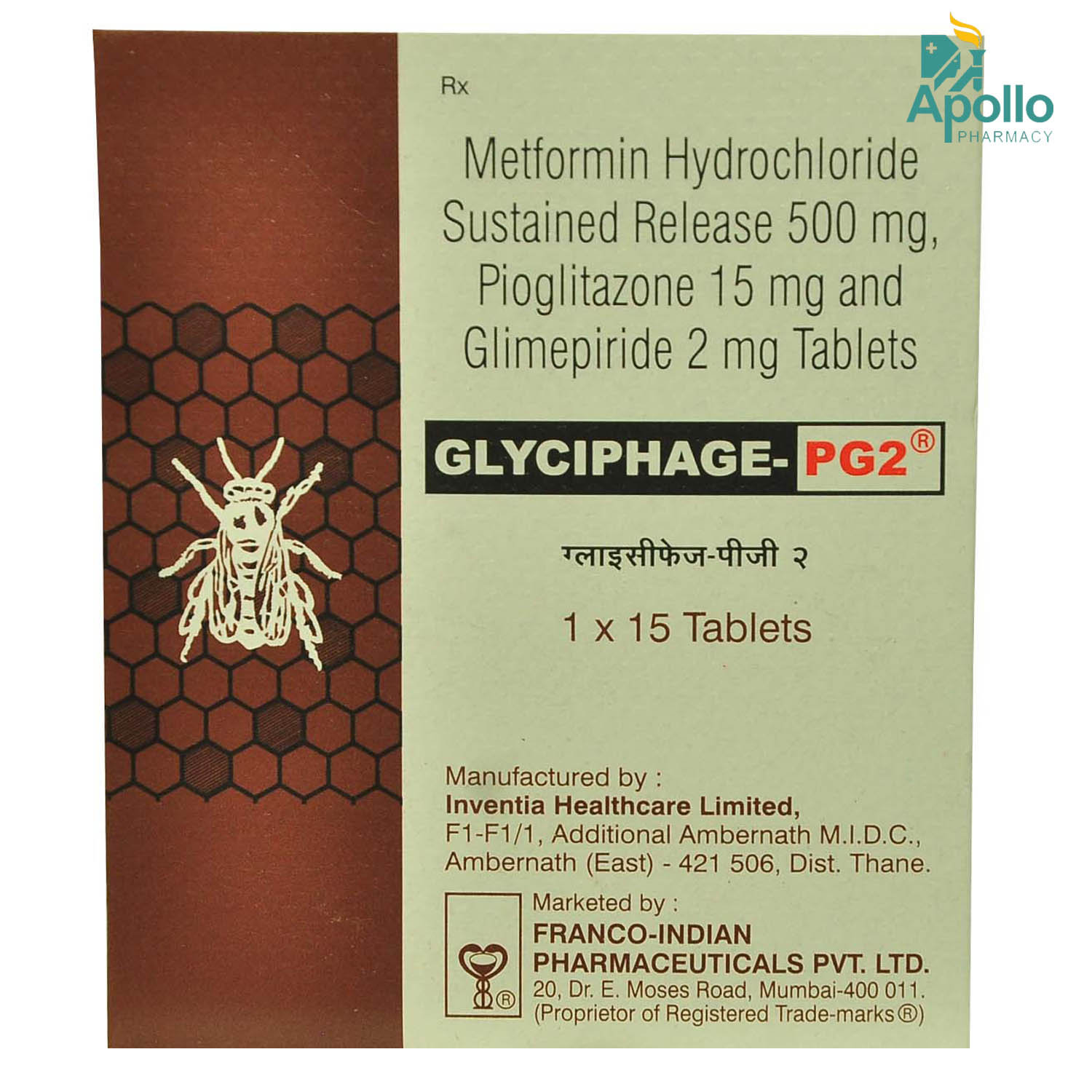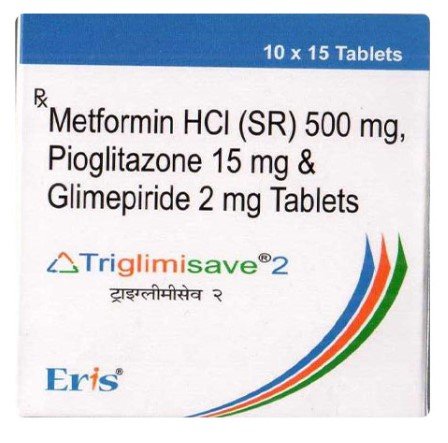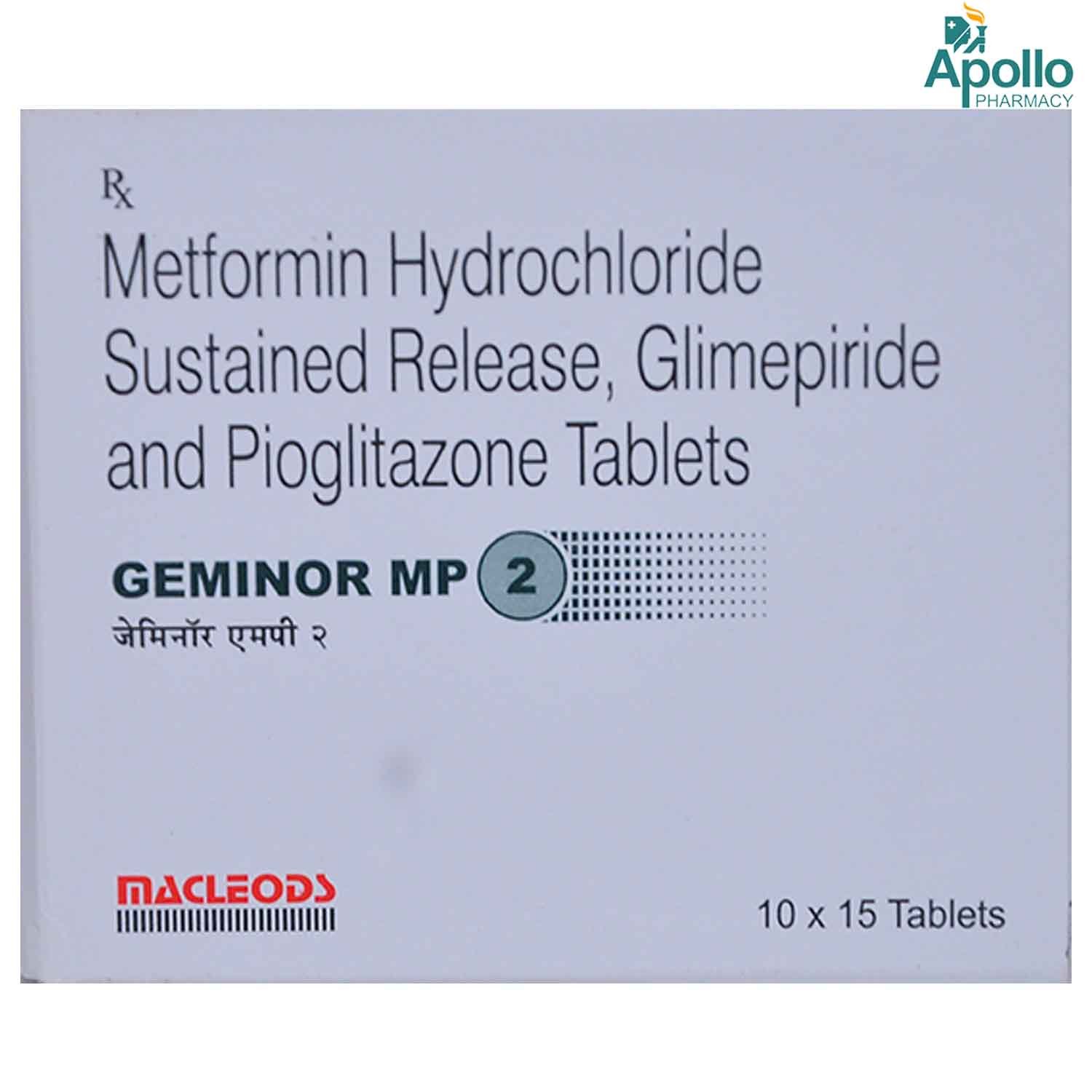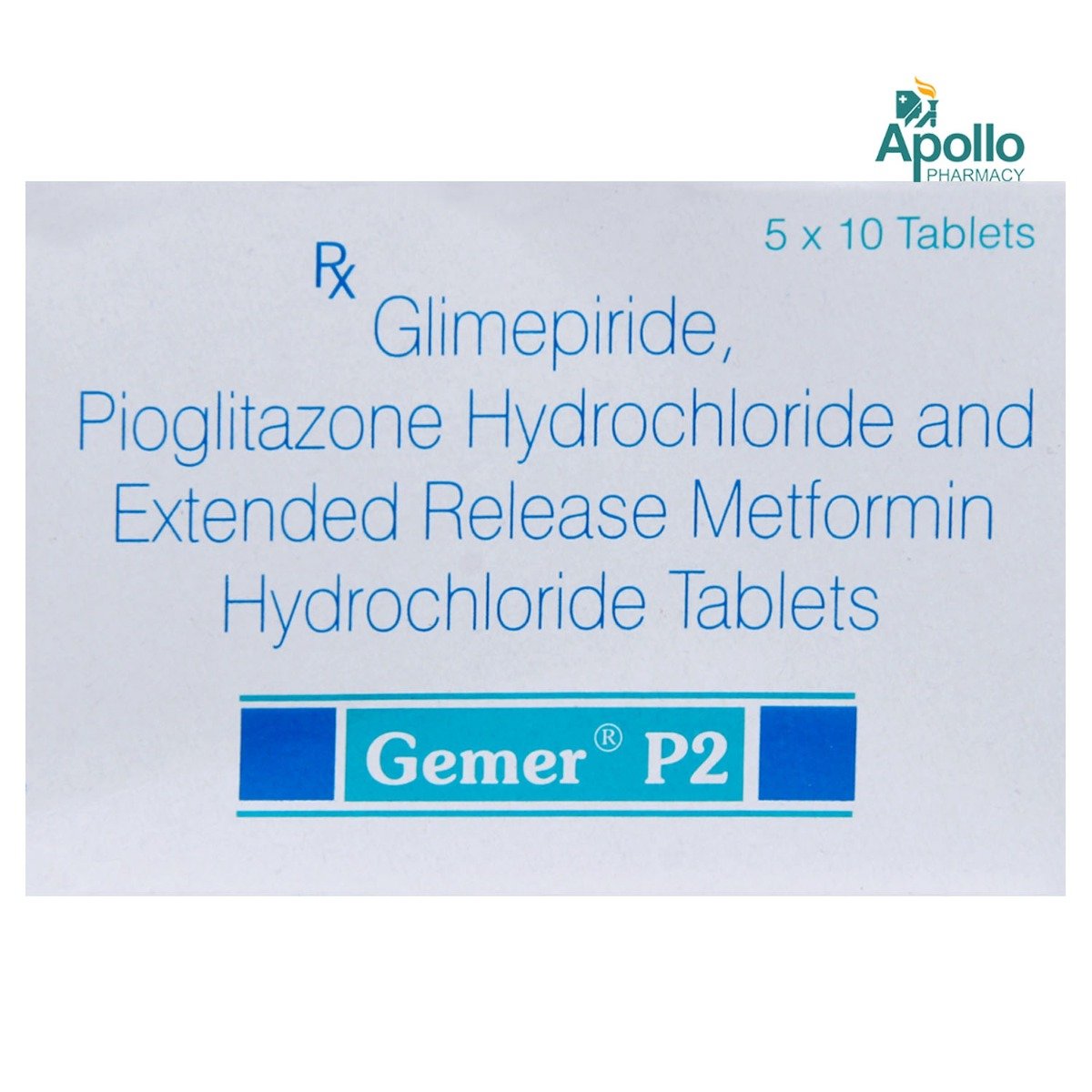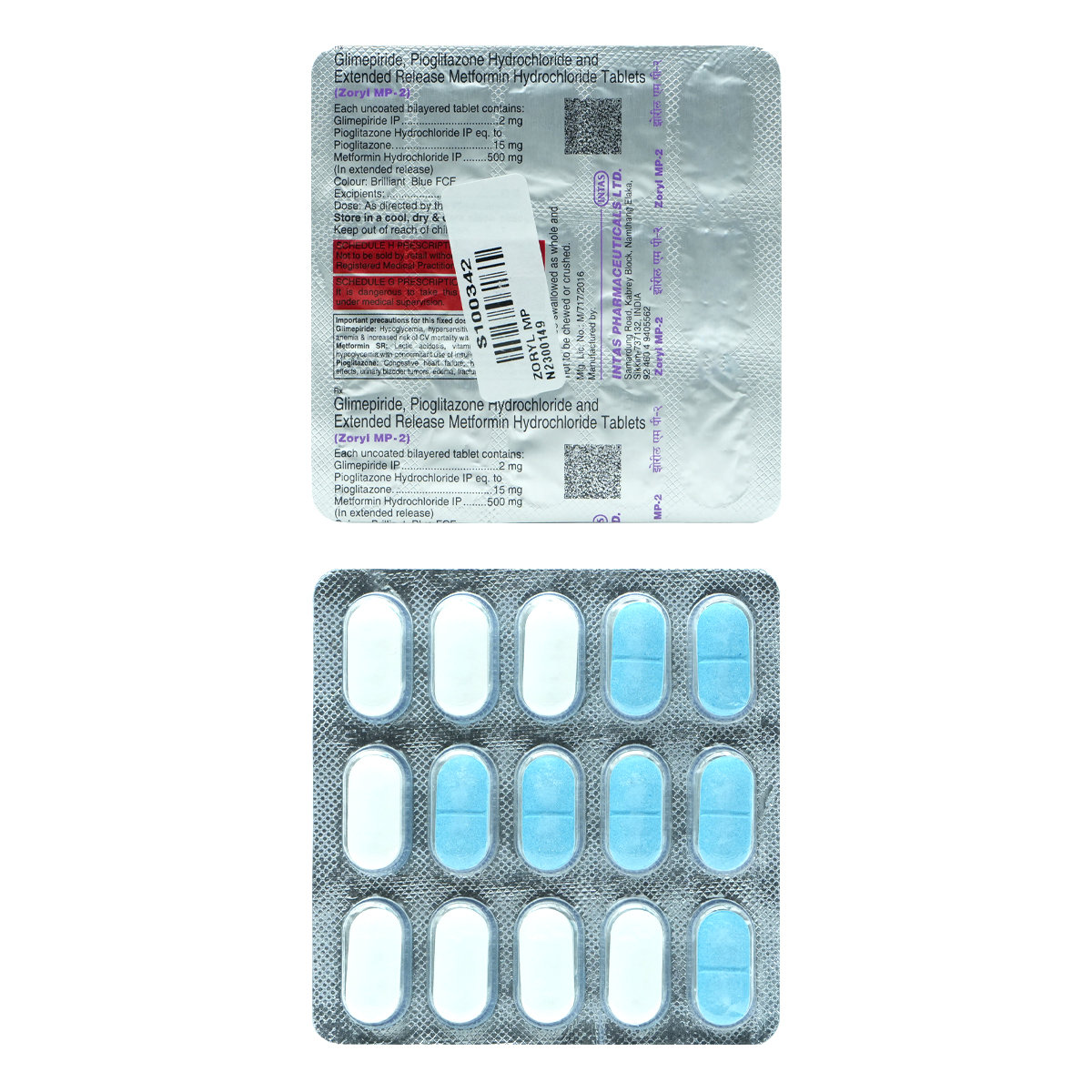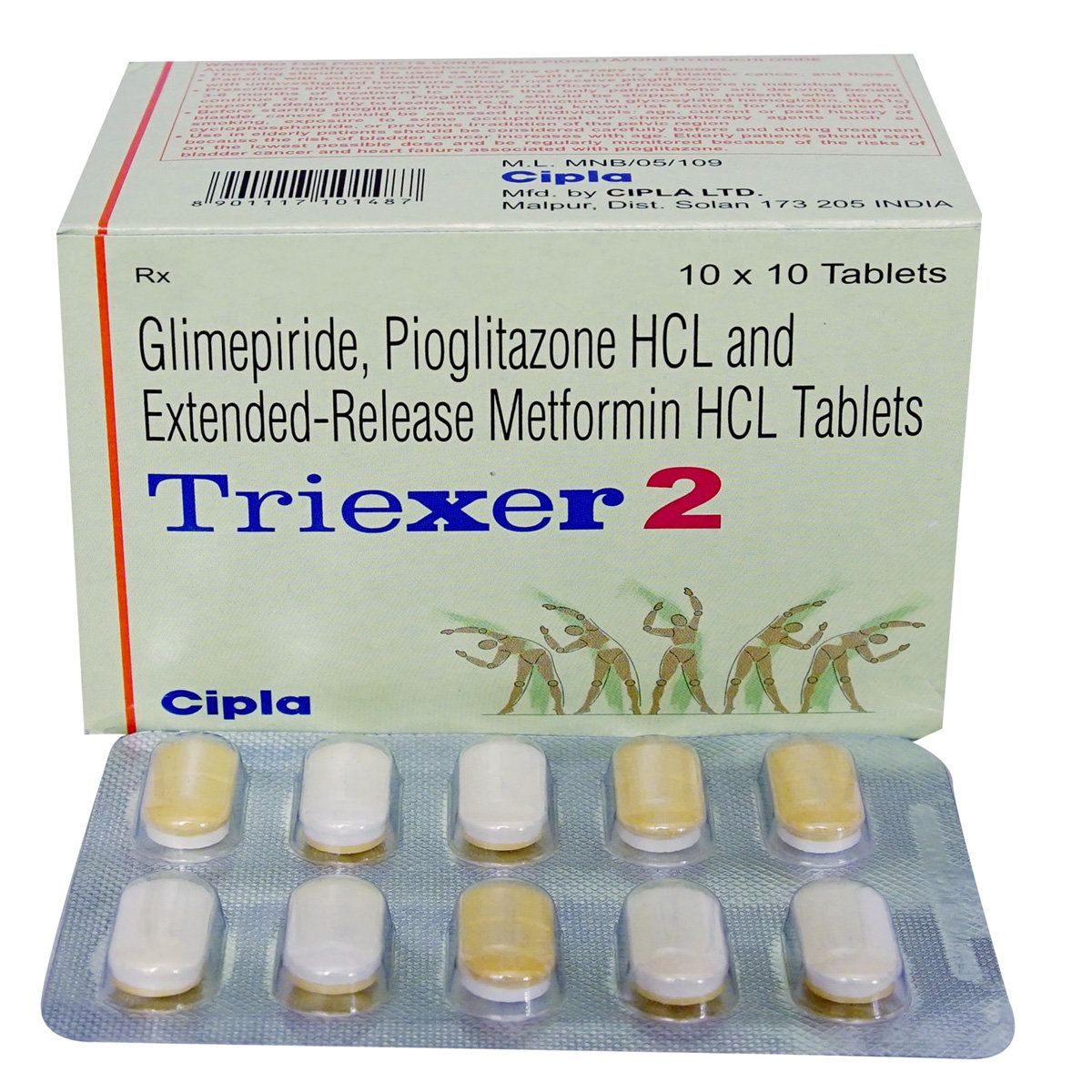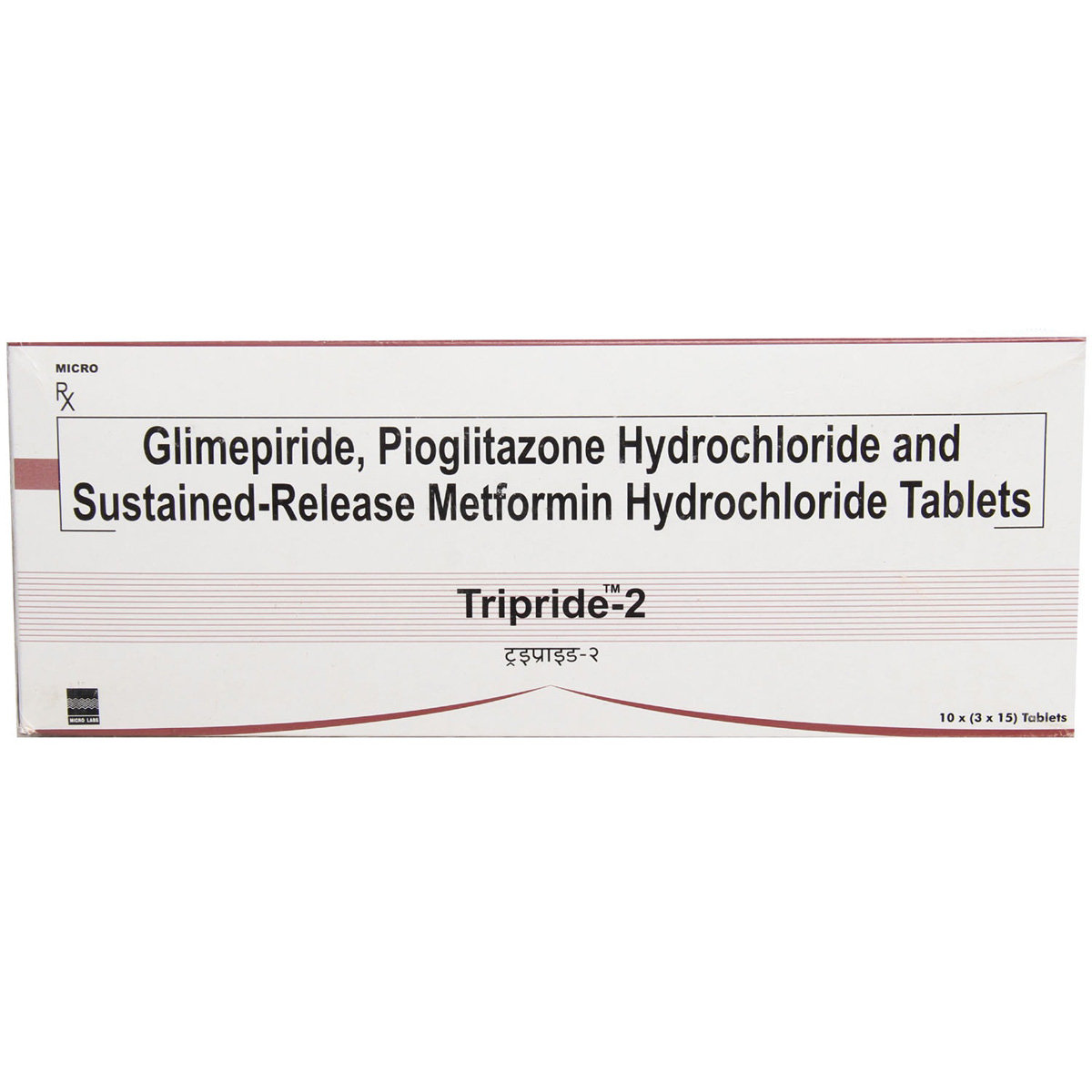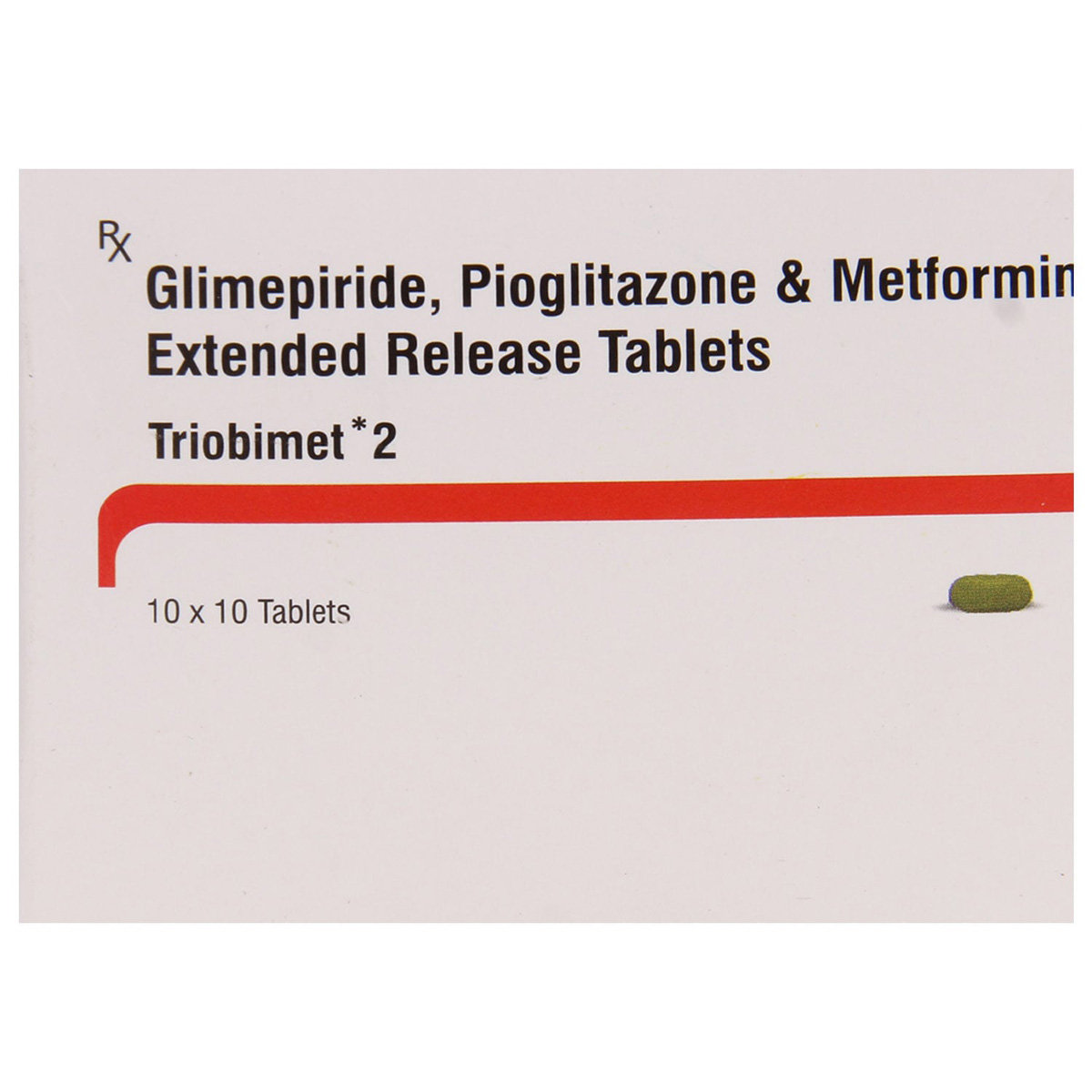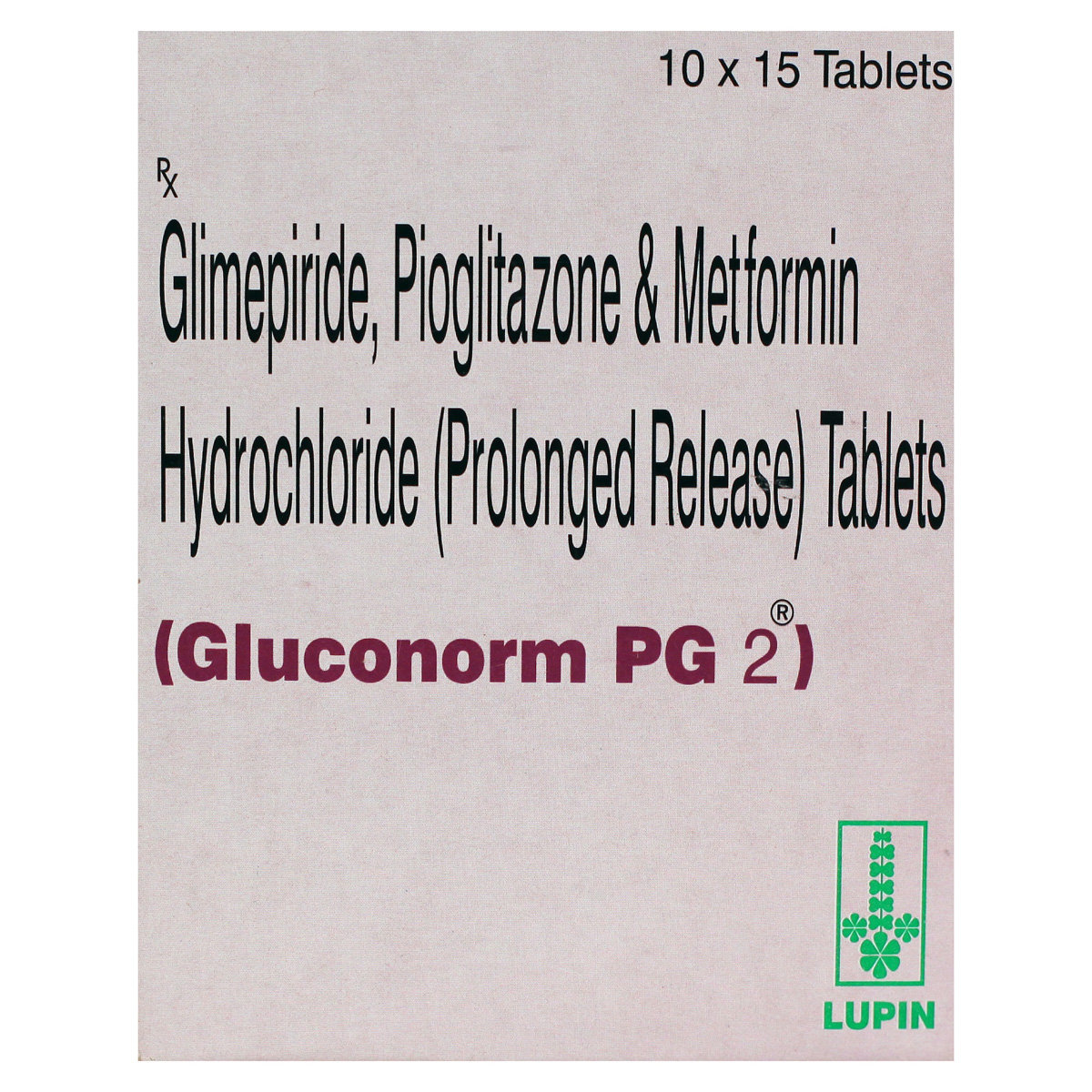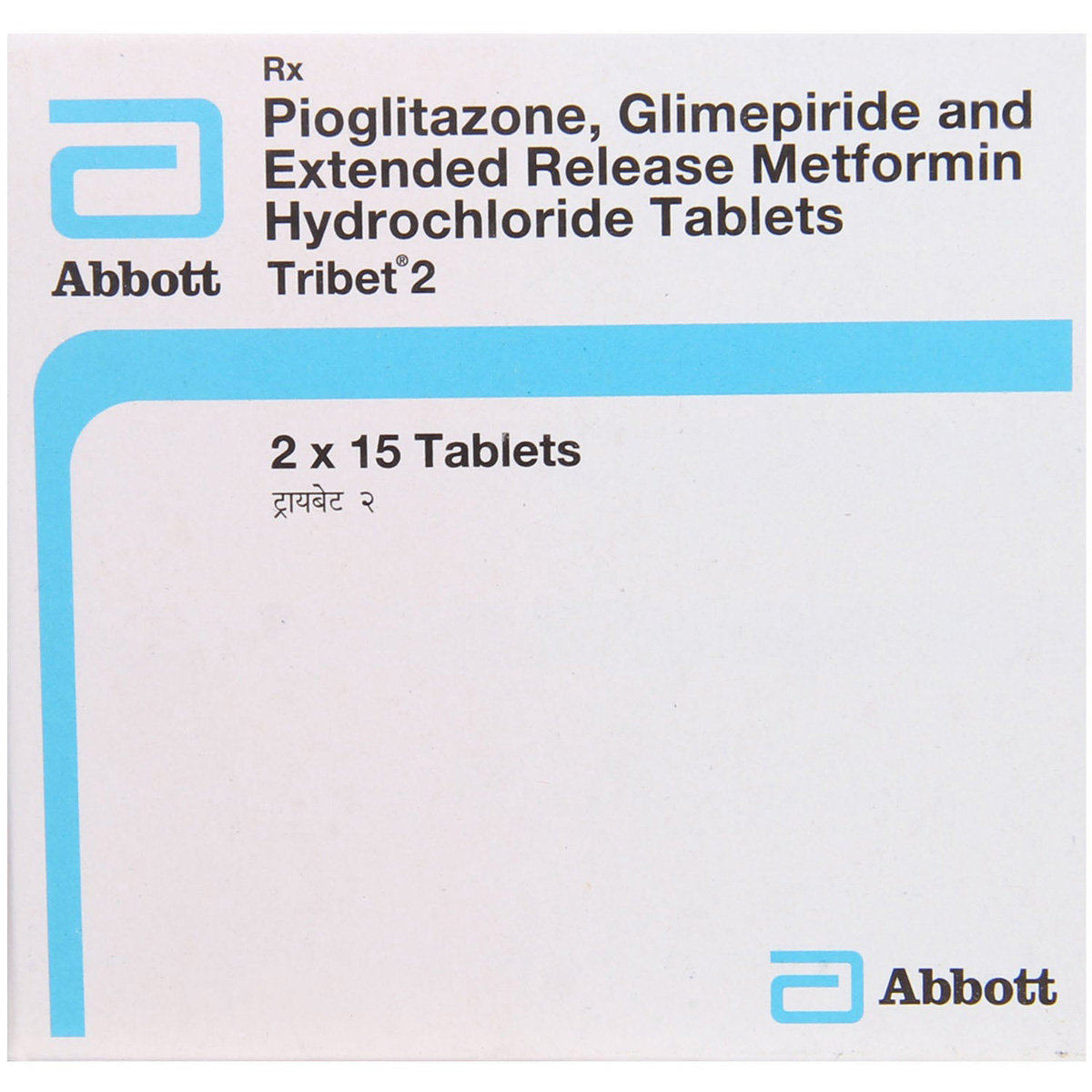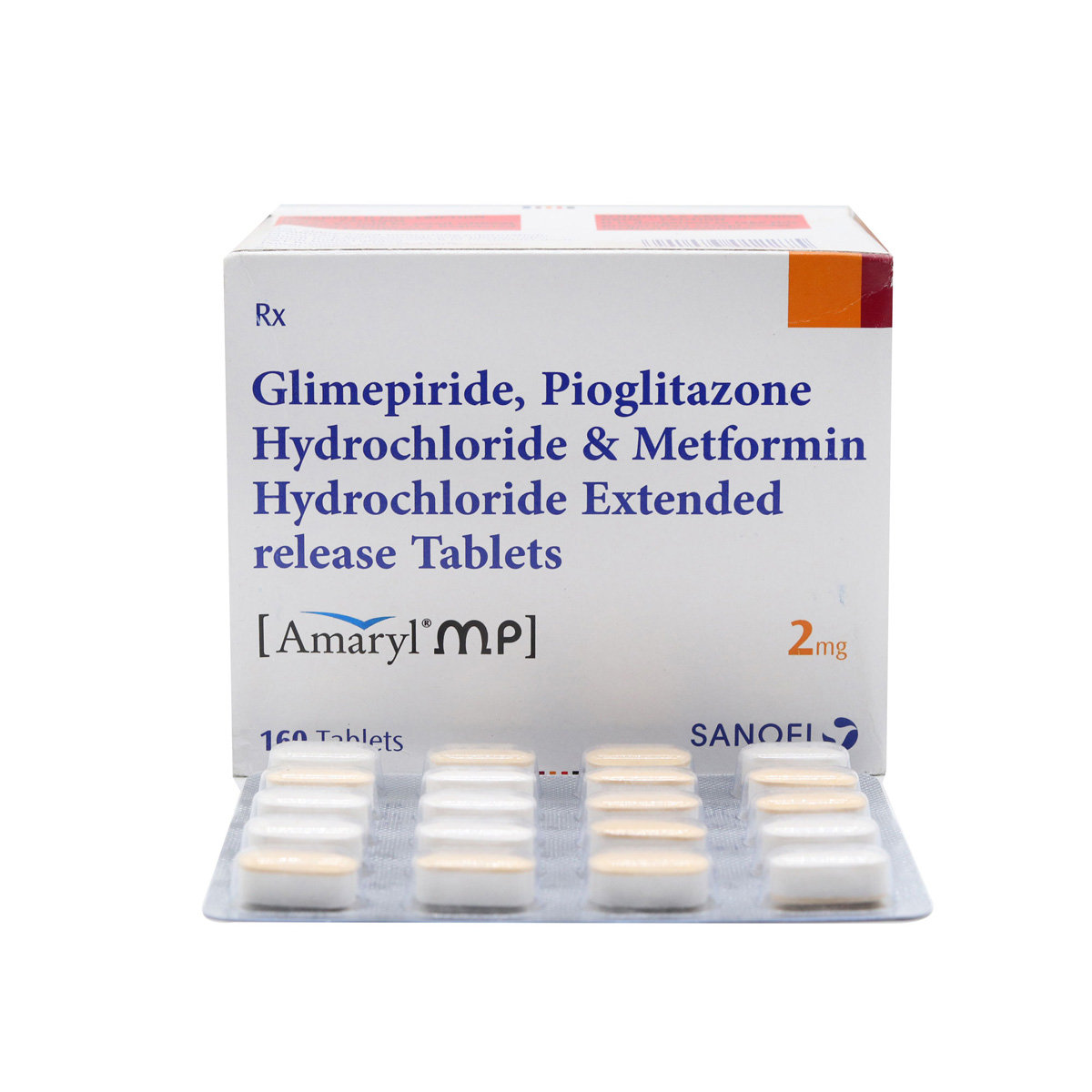Ozomet PG2 Tablet 10's
MRP ₹36.5
(Inclusive of all Taxes)
₹5.5 Cashback (15%)
Selected Pack Size:10
10 ₹32.9
(₹3.29 per unit)
In Stock
15 ₹49.1
(₹3.27 per unit)
In Stock
Provide Delivery Location
Online payment accepted
 Prescription drug
Prescription drugWhats That
Composition :
Manufacturer/Marketer :
Consume Type :
Expires on or after :
Return Policy :
About OZOMET PG 2MG TABLET
OZOMET PG 2MG TABLET belongs to the group of medications called ‘antidiabetic agents’ used in the treatment of Type 2 diabetes mellitus. Type 2 diabetes mellitus is a chronic or life-long condition in which blood sugar or glucose levels rise more than normal. It occurs when the body does not produce enough insulin (metabolizes glucose), or if produced, it cannot function properly in the body.
OZOMET PG 2MG TABLET is a combination of three medicines, namely: Metformin, Glimepiride, and Pioglitazone. Metformin acts by decreasing liver glucose production and intestinal glucose uptake. Glimepiride acts by increasing the amount of insulin released by the pancreas. Pioglitazone works by decreasing the amount of glucose released by the liver and also by improving the sensitivity of tissues towards insulin effects.
You should take this medicine as prescribed by your doctor. You may experience side-effects of such as nausea (feeling sick), vomiting (falling sick), diarrhea, headache, stomach ache, respiratory infection, weight gain, sweating, palpitations, and vision problems. Some patients experience decline in blood sugar levels lower than normal (hypoglycemia) resulting in sweating, dizziness, headache, confusion, feeling hungry, temporary changes in vision, uneasiness, irritability, and weakness. In such cases, seek medical attention immediately.
Do not take OZOMET PG 2MG TABLET if you are allergic to any of its contents. Do not use this medicine if you have heart failure, bladder cancer, or diabetic ketoacidosis (a complication of diabetes). OZOMET PG 2MG TABLET may cause ‘lactic acidosis’ (accumulation of lactic acid in the blood), which requires immediate medical attention. The risk increases if you are previously diagnosed with kidney or liver diseases. Do not consume alcohol (risk of lactic acidosis) or fast for prolonged periods (risk of hypoglycemia). Also, inform your doctor if you are pregnant, planning to become pregnant, or breastfeeding.
Uses of OZOMET PG 2MG TABLET
Directions for Use
Key Benefits
OZOMET PG 2MG TABLET contains Metformin, Glimepiride, and Pioglitazone. OZOMET PG 2MG TABLET is given when single or dual therapy of hypoglycemic agents is not effective in diabetes patients. Metformin acts by decreasing liver glucose production and intestinal glucose uptake. Glimepiride acts by increasing the secretion of insulin by the pancreas. Pioglitazone works by decreasing the amount of glucose released by the liver and improving insulin sensitivity in muscle and fat.
Storage
- If you experience low blood sugar levels, inform your doctor. They will assess the severity and make recommendations for the next actions.
- Your doctor will assess your symptoms, blood sugar levels, and overall health before recommending the best course of action, which may include treatment, lifestyle modifications, or prescription adjustments.
- Follow your doctor's instructions carefully to manage the episode and adjust your treatment plan.
- Make medication adjustments as recommended by your doctor to prevent future episodes.
- Implement diet and lifestyle modifications as your doctor advises to manage low blood sugar levels.
- Monitor your blood sugar levels closely for patterns and changes.
- Track your progress by recording your blood sugar levels, food intake, and physical activity.
- Seek further guidance from your doctor if symptoms persist or worsen so that your treatment plan can be revised.
- Reduce salt intake to minimize fluid buildup.
- Use compression stockings, sleeves, or gloves.
- Gently massage the affected area towards the heart.
- Protect the swollen area from injury and keep it clean.
- Use lotion or cream to keep the skin moisturized.
- Inform your doctor about the nausea and discuss possible alternatives to the medication or adjustments to the dosage.
- Divide your daily food intake into smaller, more frequent meals to reduce nausea.
- Opt for bland, easily digestible foods like crackers, toast, plain rice, bananas, and applesauce.
- Avoid certain foods that can trigger nausea, such as fatty, greasy, spicy, and smelly foods.
- Drink plenty of fluids, such as water, clear broth, or electrolyte-rich beverages like coconut water or sports drinks.
- Use ginger (tea, ale, or candies) to help relieve nausea.
- Get adequate rest and also avoid strenuous activities that can worsen nausea.
- Talk to your doctor about taking anti-nausea medication if your nausea is severe.
- Record when your nausea occurs, what triggers it, and what provides relief to help you identify patterns and manage your symptoms more effectively.
- Preventing Vomiting (Before it Happens)
- Take medication exactly as prescribed by your doctor. This can help minimize side effects, including vomiting.
- Having a small meal before taking your medication can help reduce nausea and vomiting.
- Talk to your doctor about taking anti-nausea medication along with your prescribed medication.
- Managing Vomiting (If it Happens)
- Try taking ginger in the form of tea, ale, or candy to help alleviate nausea and vomiting.
- What to Do if Vomiting Persists
- Consult your doctor if vomiting continues or worsens, consult the doctor for guidance on adjusting your medication or additional treatment.
- Inform Your Doctor: Notify your doctor immediately about your diarrhoea symptoms. This allows them to adjust your medication or provide guidance on managing side effects.
- Stay Hydrated: Drink plenty of fluids to replace lost water and electrolytes. Choose water, clear broth, and electrolyte-rich drinks. Avoid carbonated or caffeinated beverages to effectively rehydrate your body.
- Follow a Bland Diet: Eat easy-to-digest foods to help firm up your stool and settle your stomach. Try incorporating bananas, rice, applesauce, toast, plain crackers, and boiled vegetables into your diet.
- Avoid Trigger Foods: Steer clear of foods that can worsen diarrhoea, such as spicy, fatty, or greasy foods, high-fibre foods, and dairy products (especially if you're lactose intolerant).
- Practice Good Hygiene: Maintain good hygiene to prevent the spread of infection. To stay healthy, wash your hands frequently, clean and disinfect surfaces regularly, and avoid exchanging personal belongings with others.
- Take Anti-Diarrheal Medications: If your doctor advises, anti-diarrheal medications such as loperamide might help manage diarrhoea symptoms. Always follow your doctor's directions.
- Keep track of your diarrhoea symptoms. If they don't get better or worse or are accompanied by severe stomach pain, blood, or dehydration signs (like extreme thirst or dark urine), seek medical help.
Drug Warnings
OZOMET PG 2MG TABLET should be used with caution in patients with heart diseases as it increases the risk of heart failure. OZOMET PG 2MG TABLET may cause ‘lactic acidosis’ (buildup of lactic acid in the blood), characterized by abdominal pain, muscle cramps, vomiting, severe fatigue, and difficulty breathing. It is a life-threatening condition that requires immediate medical attention. Inform your doctor if you have any severe liver or kidney problems as their normal functioning is required to eliminate excess lactic acid from the body. Do not consume excess alcohol as it increases the risk of lactic acidosis. OZOMET PG 2MG TABLET may lower vitamin B12 levels, so it is recommended to take blood tests regularly to identify any vitamin deficiencies.
Drug-Drug Interactions
Drug-Drug Interactions
Login/Sign Up
Co-administration of Ozomet PG2 Tablet and Iodamide can increase the risk of lactic acidosis (when the body produces too much lactic acid).
How to manage the interaction:
Taking Ozomet PG2 Tablet with Iodamide is generally avoided as it can result in an interaction, please consult your doctor before taking it.
Co-administration of Ozomet PG2 Tablet and Iobenzamic acid can increase the risk of lactic acidosis (when the body produces too much lactic acid).
How to manage the interaction:
Taking Ozomet PG2 Tablet with Iobenzamic acid is generally avoided as it can result in an interaction, please consult your doctor before taking it.
Co-administration of Ozomet PG2 Tablet with Metrizamide together can cause the risk of lactic acidosis (when the body produces too much lactic acid ).
How to manage the interaction:
Taking Ozomet PG2 Tablet with Metrizamide is generally avoided as it can possibly result in an interaction, it can be taken if a doctor has advised it. However, if you experience headaches, muscle cramps or pain, contact a doctor immediately. Do not discontinue any medications without consulting a doctor.
Co-administration of Iopydol with Ozomet PG2 Tablet can increase the risk of side effects.
How to manage the interaction:
Taking Ozomet PG2 Tablet with Iopydol is not recommended, please consult your doctor before taking it.
Co-administration of Ozomet PG2 Tablet and Iocarmic acid can increase the risk of lactic acidosis (when the body produces too much lactic acid).
How to manage the interaction:
Taking Ozomet PG2 Tablet with Iocarmic acid is generally avoided as it can result in an interaction. please consult your doctor before taking it.
Co-administration of Iodixanol with Ozomet PG2 Tablet can increase the risk of side effects.
How to manage the interaction:
Taking Ozomet PG2 Tablet with Iodixanol is not recommended, please consult a doctor before taking it. Do not discontinue the medications without consulting a doctor.
Co-administration of Ozomet PG2 Tablet and Iobitridol can increase the risk of lactic acidosis (when the body produces too much lactic acid).
How to manage the interaction:
Taking Ozomet PG2 Tablet with Iobitridol is generally avoided as it can result in an interaction. Please consult your doctor before taking it.
Co-administration of Ioversol with Ozomet PG2 Tablet can increase the risk of side effects.
How to manage the interaction:
Taking Ozomet PG2 Tablet with Ioversol is not recommended, please consult your doctor before taking it.
Co-administration of Iopamidol with Ozomet PG2 Tablet can increase the risk of side effects.
How to manage the interaction:
Taking Ozomet PG2 Tablet with Iopamidol is not recommended, please consult a doctor before taking it. Do not discontinue the medications without consulting a doctor.
Co-administration of Iotroxic acid with Ozomet PG2 Tablet can increase the risk of side effects.
How to manage the interaction:
Taking Ozomet PG2 Tablet with Iotroxic acid is not recommended, please consult your doctor before taking it.
Drug-Food Interactions
Drug-Food Interactions
Login/Sign Up
Diet & Lifestyle Advise
- Fill your half plate with starchy veggies, a quarter with proteins, and a quarter with whole grain.
- Eat at regular intervals. Do not take the long gap between a meal or snack.
- Monitor your blood sugar level regularly especially when there are a lot of fluctuations.
- Invest at least 150 min of moderate-intensity physical activity and 15 minutes of high-intensity exercise every week.
- Lose weight gradually to achieve a healthy body mass index (18.5 to 24.9).
- Replace refined carbohydrates containing foods with whole grain foods and increase intake of fruits and veggies and other fiber-enriched foods.
- Reduce intake of saturated fat (or hidden fats) in food like chips, crisps, pastries, biscuits, and samosas. Choose omega 3 fatty acid-containing oils for daily cooking. For frying, you may use palm oil, mustard oil, groundnut oil, rice bran oil, and safflower oil.
- Do not take stress as it may elevate your blood sugar level. You may adopt stress management techniques like mindfulness, yoga, or meditation to control stress-related blood sugar changes.
- Opt for low-fat dairy products (low-fat yogurt, fat-free milk, and cheese, etc.).
- Keep your blood pressure as normal (120/80) as possible as it reduces the risk of heart diseases in diabetes patients.
Side Effects of OZOMET PG 2MG TABLET
- Nausea (feeling sick)
- Vomiting (falling sick)
- Diarrhea
- Headache
- Stomach ache
- Respiratory infection
- Weight gain
- Sweating
- Palpitations
- Numbness
- Vision problems
Habit Forming
Therapeutic Class
All Substitutes & Brand Comparisons
RX
Pioplus 2 Tablet 15's
Systopic Laboratories Pvt Ltd
₹108
(₹6.48 per unit)
96% COSTLIERRX
Triglynase 2 Tablet 10's
USV Pvt Ltd
₹93.5
(₹8.42 per unit)
155% COSTLIERRX
Glimestar-PM 2 Tablet 10's
Mankind Pharma Pvt Ltd
₹117
(₹10.53 per unit)
220% COSTLIER
Drug-Diseases Interactions
Drug-Diseases Interactions
Login/Sign Up
FAQs
Drug-Drug Interactions Checker List
- RIFAMPICIN
- TETRACYCLINE
- CLARITHROMYCIN
- FLUCONAZOLE
- PROBENECID
Special Advise
- OZOMET PG 2MG TABLET shows optimum effects when you follow healthy lifestyle changes like weight loss, regular exercise, healthy diet, etc.
- Keep taking the drug even if you think your blood sugar levels are under control. If you miss a dose, do not take a larger dose, consult your treating physician for advice.
- Take short frequent meals, avoid prolonged fasting when taking this drug. Beware of symptoms of hypoglycemia which include sweating, dizziness, palpitations, shivering, intense thirst, dry mouth, dry skin, frequent urination, etc. Whenever you experience the above-mentioned symptoms, immediately consume 5-6 candies or 3 glucose biscuits or 3 teaspoons of honey/sugar and also get in touch with your physician. Make sure to carry these with you at all times, especially for long travels.
- Avoid drinking alcohol while on this drug as it increases the risk of hypoglycemia (decrease in blood sugar which might be fatal in some cases) and lactic acidosis (when the lactic acid increases in the body which impacts the functioning of various organs in the body).
- Try to quit smoking and reduce intake of carbohydrate-rich food like potato, rice, mangoes, bread, sugar, etc.
Disease/Condition Glossary
Type 2 diabetes mellitus: It is a chronic condition in which blood glucose levels are elevated in the body. Insulin is responsible for the utilization of glucose by the cells. In type 2 diabetes, the body cells do not respond to insulin, or in later stages, your body may not produce enough insulin. Symptoms include excessive thirst, excessive hunger, fatigue, increased appetite, and dry mouth. This condition may worsen over time and cause toxic effects if not properly treated.

Have a query?
Alcohol
Safe if prescribed
Alcohol may increase the risk of side-effects and worsen the condition.
Pregnancy
Consult your doctor
OZOMET PG 2MG TABLET is a category C drug and may cause harmful effects to the unborn baby. So, it is used only when the benefits of this medicine outweigh the risks.
Breast Feeding
Consult your doctor
OZOMET PG 2MG TABLET should not be used in breastfeeding mothers as it may get secreted in the breast milk and cause unwanted effects in the nursing babies.
Driving
Safe if prescribed
OZOMET PG 2MG TABLET may cause vision problems. So, do not drive or operate heavy machinery if you have any problems with your vision while using OZOMET PG 2MG TABLET.
Liver
Consult your doctor
OZOMET PG 2MG TABLET should be taken with caution in patients with liver diseases. The dose may have to be adjusted by your doctor.
Kidney
Consult your doctor
OZOMET PG 2MG TABLET should be taken with caution especially if you have a history of kidney diseases. The dose may have to be adjusted by your doctor.
Children
Safe if prescribed
OZOMET PG 2MG TABLET is not recommended for use in children below 18 years of age.
Recommended for a 30-day course: 3 Strips




